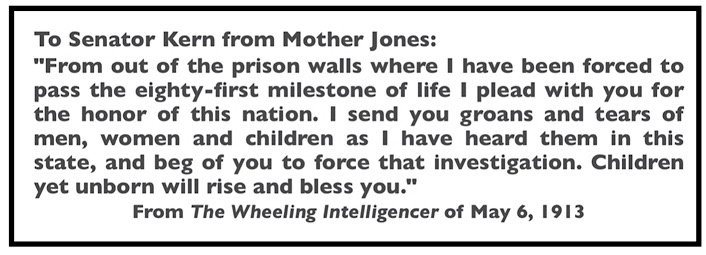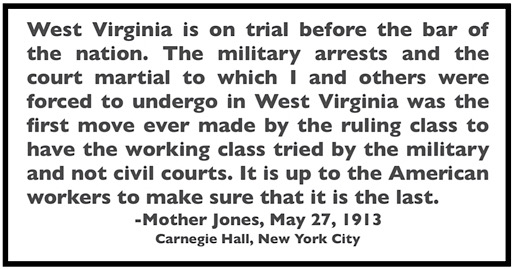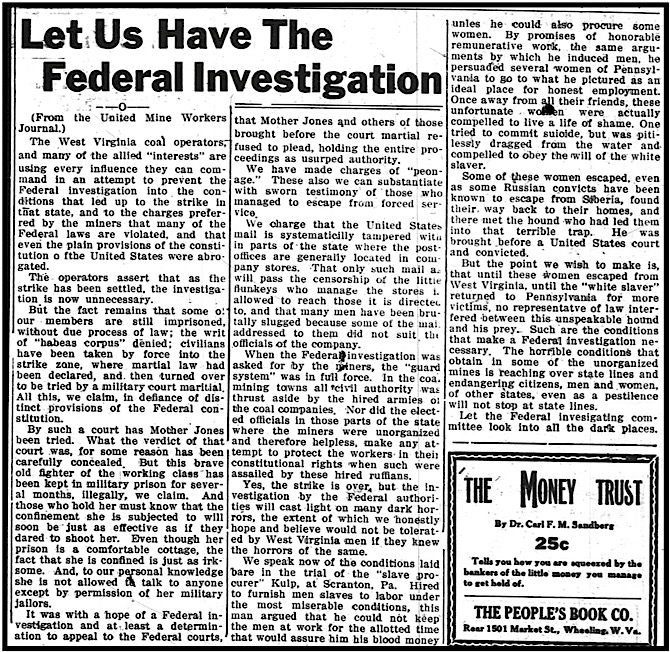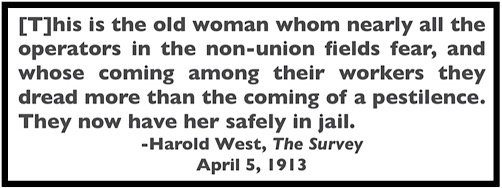 —————
—————
Hellraisers Journal – Friday May 30, 1913
Washington, D. C. – Senate Orders Inquiry into West Virginia Coalfields
From the Bridgeport Evening Farmer (Connecticut) of May 29, 1913:
 —————
—————
Hellraisers Journal – Friday May 30, 1913
Washington, D. C. – Senate Orders Inquiry into West Virginia Coalfields
From the Bridgeport Evening Farmer (Connecticut) of May 29, 1913:
 —————
—————
Hellraisers Journal – Thursday May 29, 1913
New York, New York – Mother Jones Speaks to Socialists at Carnegie Hall
From The New York Call of May 27, 1913:
From The New York Call of May 28, 1913:
This was the scene, as described by the New York Call, when Mother Jones was introduced by Max Eastman last night at Carnegie Hall:
Scarcely had her name left his lips then the audience burst into shouting, stamping, and handclapping. Several women surged down the aisle toward the stage and threw kisses to the aged agitator and flowers at her feet.
Mother Jones spoke at length about the West Virginia strike, the terror inflicted on the miners by the gun thugs, and the mass round-up of strikers by the military. She referred to West Virginia as “The Little Russia in America.” She sounded this warning:
West Virginia is on trial before the bar of the nation. The military arrests and the court martial to which I and others were forced to undergo in West Virginia was the first move ever made by the ruling class to have the working class tried by the military and not civil courts. It is up to the American workers to make sure that it is the last.
The comfortable New York Socialist were not spared the ire of Mother Jones:
What galled me most about my confinement at the military prison at Pratt, West Virginia, was the knowledge that a bunch of corporation lickspittles had the right to confine me. But I must be frank and tell you that the second thing that galled me was the silence of many here tonight who should have shouted out against the injustice. I would still be in jail if Senator Kern had not introduced his resolution… No thanks, then, to you that I am here today. Cowards! Moral cowards! If you had only risen to your feet like men and said, “We don’t allow military despotism in America! Stop it!” A lot of moral cowards you are. Not a word of protest did we get out of you, but instead you sat idly by and let these things be.
The New York Call continued:
After Mother had spoken a collection was taken up and $267.80 contributed. It was intended for the striking miners. Mother Jones announced the miners would take care of the miners, and said the collection could go to the Paterson silk strikers.
[Emphasis added.]
 —————
—————
Hellraisers Journal – Monday May 26, 1913
“To Mother Jones” -a Poem by Mary Quinlan Laughlin
From The Goltry (Oklahoma) News of May 23, 1913:
 —————
—————
Hellraisers Journal – Sunday May 25, 1913
Letter from Mother Jones Sent Out from West Virginia’s Military Bastile
From the Iola (Kansas) Co-Operator of May 24, 1913:
LETTER FROM MOTHER JONES
———-Pratt, W. Va., May 1, 1913.
Military Bastile.Lee J. Dock,
1502 N. Carson
San Antonio, Texas,Dear Comrade:
Your letter of the 8th reached me in due time but I was unable to answer it before owing to the fact that I was locked up in a military prison and had no chance to do any writing. Now that some of the militia has been taken away I am a little freer but still a prisoner.
I appreciate your letter very highly and wish I would have been able to reply to it earlier but owing to the fact that I was here under the militia and you know when the sewer rats are keeping guard on you day and night it is pretty hard to do as you would like to. We have had a hard fight of it here. It was the first time in history of industrial warfare in America, that we the workers, were pulled up and tried before a Military Court and it was a picture to look at. Those representatives of ancient warfare in the days of the Spanish inquisition never presented anything more brutal looking than that court did to me. It was a disgrace to America and every man in it.
There is not a man in America with any pride but what should blush with shame. Just think, a bunch of those guards dressed up as uniformed murderers, watching an old woman 80 year of age in the early dawn of the 20th century. I wonder what Victor Hugo would say if he were alive, how beautiful he would portray this great civilization. If our Socialists would act more and talk less we might get some results.
I wish you would call and see Dr. Zouck and give him my regards and tell him that I often think of him and that I have not forgotten him and never will, for he is a man, every inch of him, but I have been so rushed for the want of time that I have been unable get time to write him.
I hope some day soon to have the pleasure of seeing you in San Antonio, so good bye and believe me
Yours in the cause of Justice,
MOTHER JONES.
Per M. D.[Photograph, paragraph break and emphasis added.]
 —————
—————
Hellraisers Journal – Saturday May 24, 1913
West Virginia’s Class-War Prisoners Released
From The Wheeling Majority of May 22, 1913:
Governor Hatfield Releases Prisoners from West Virginia’s Military Bastile
Executive Board of U. M. W. A. on West Virginia Strike Settlement
United Mine Workers Journal Supports Federal Investigation of W. V. Strike

 —————
—————
Hellraisers Journal – Thursday May 22, 1913
A Poem for Mother Jones, “The White Haired Angel,” by L. D. Gillespie
From the Oklahoma Social Democrat of May 21, 1913:
 —————
—————
Hellraisers Journal – Tuesday May 20, 1913
Pittsburgh, Pennsylvania – Mother Jones Speaks at Lyceum Theater
From The Pittsburg Press of May 19, 1913:
“MOTHER” JONES MAKES ROUSING
ADDRESS HERE
———-
Says West Virginia Officials Form
“Pack of Anarchists.”
Takes Vigorous Rap at Pennsylvanians
———-AGED LABOR LEADER CRITICISES CONGRESS
———-
Arraigning Pennsylvanians as moral cowards for permitting the present state of affairs to exist in the West Virginia mining country; scoring the West Virginia authorities bitterly, and never dropping her high note of enthusiasm for a single instant, “Mother” Jones, the noted woman leader yesterday, in the Lyceum theater talked to a crowded house which applauded almost every sentence. She was presented with a huge bunch of flowers by the Slavonic Associated Press.
The world-renowned labor organizer, who confessed yesterday to being aged 81, made an imposing figure as, white-haired, erect, nervous and virile, she completely possessed the stage during her speech, and, incidentally her audience as well. Among other things, she said:
[The speaker declared:]
If one were to go to the West Virginia strike region and see the indescribable conditions I have seen there, he would say that America is darker than even Russia was; darker than even barbarous Mexico was. The harrowing stories I could tell as I have seen them there would paralyze the heart of the Nation-if it had a heart. But we’re so hypnotized by our ruling class.
THREATS BROUGHT DEFIANCE.
When I went to Cabin Creek last May they told me that if I went up there at an organizer I would come back on a stretcher, but I defied them.
[She almost screamed:]
You people in Pennsylvania are moral cowards. The nation never gave you so great an opportunity to show yourselves as when it gave you the story of the drum-head court by military despots such as we were brought before. And you sat idly by and did nothing! If you can get a bigger pack of anarchists than the public officials of West Virginia I want to find them!
“Mother” Jones spent her eighty-first birthday in jail. She had the locals of the miners’ union elect delegates to lay their grievances before the governor, W. E. Glasscock, of West Virginia and went with these delegates to Charleston. It was then, she says, that the governor became alarmed, fearing from her reputation as an agitator that she meant trouble. A warrant was issued for her arrest and she spent some time under guard, some of the delegates being imprisoned also.
Harold W. Houston, secretary of the Socialist party of West Virginia, closed the meeting by referring to conditions in the strike zone of his state. He urged co-operation on the part of the party here to aid in righting the wrongs which he claims have been done organized labor in the “Mountain State.”
Mother Jones made a great appeal for the protection of the home and didn’t neglect to inject a smart rap at congress occupying “a whole session talking about the navy and how much money to spend on it, but not a dollar to protect the childhood of the nation.”
[Photograph and emphasis added.]
Excerpt from The New York Times of May 19, 1913:
We’re going to organize the state of West Virginia if every one of us dies in the battle…I’m going back to West Virginia. If I can’t go on a train, I’ll walk in…[Before going into the trouble zone] one of the boys told me: “If you go up there, Mother, you’ll come back on a stretcher, no organizer can speak there!” I spoke there. I didn’t come out on a stretcher. I raised hell.
…I organized the women because the women can lick a non-union man better than you fellows here can…
Labor must stand together. You trades unions must stop wrangling with the I.W.W., and the I.W.W. must stop wrangling with the trades unions I know industrial unionism is coming, and you can’t stop it.
[Emphasis added.]
 —————
—————
Hellraisers Journal – Monday May 19, 1913
“The Last Day of the Paint Creek Court Martial” by Cora Older, Part II
From The Independent of May 15, 1913:
[Part II of II]
During the recess I had a few minutes’ conversation with Mother Jones. Her eighty years were as nothing—she became a rollicking, irrepressible girl. She liked everyone, even the military court. She told me she was not against the judges, but their jobs. As for the young officer appointed against her wishes her counsel, like an affectionate mother she said, “He’s a nice fellow, only, you know, he’s not my attorney.” She turned to one of the judges who was passing: “Don’t dare find against me. If you do, I’ll——” she shook her fist with a touch revealing coquetry.
When I returned for the evening session, already a crowd had gathered in the street before the court room. Prisoners’ wives with shawls over their heads, leading children, had walked a mile or more. They knew there was no chance to enter the court room, but they stood in the streets, hoping to catch echoes of speeches thru the open windows. One woman flung at a soldier: “Scabs at a dollar and a half a day.” In West Virginia, women fight side by side with men.
Eight or ten sympathizers of the prisoners had already filled the benches in the gas-lit hall. “Everybody’s Dearest Friend” had preceded me. Again he gave me water and a newspaper. The prisoners filed into the room.
“A bad-looking lot of fellows,” he offered.
“Badly dressed,” I answered.
“No, bad men. You ought to know what these miners are. If you had seen and heard what I have.”
A sympathizer with the strikers seated on a bench behind me touched my arm. “Do you know you are talking with Smith, a Burns detective?”
Mr. Smith conferred with the provost marshal, also Associated Press correspondent. Word was sent to the judges’ table. The judge advocate rose and advised all women except me to leave the court room. The women obeyed. A smile played round the lips of Mr. Smith, flirted in the provost marshal’s eyes, and lighted up the table where the judges sat.
The smile died when M. F. Matheny, an attorney for the defendants, rose and said: “These women are friends of the prisoners. They are as much interested in the trial as the men themselves. This man Smith has no right in the court room. He should be excluded if the women are. The court has ruled that no witness after testifying shall remain.”
The court blithely overruled itself and then went on dealing out justice to “criminals.” I was proud to know Mr. Smith. He had invented a new misdemeanor; to mention his name was lèse–Smith. This great court he dominated. William J. Burns was his visible employer. I speculated much about his invisible employer.
I was not to speculate long. An attorney’s speech disclosed that Smith, the gentle overlord of the room, was in the employ of the mine operators. The attorney also revealed that Smith was an excellent detective. He had gone to the strikers, pretended to be in need, had eaten their bread when they had only strike rations. On one occasion his life had been saved by one of the prisoners. The detective had recorded the many violent words uttered and had become chief witness for the state.
While the first speeches were being made, Mr. Smith, the mine operators’ representative, unrebuked by the court, noisily used the telephone. Apparently the judges and Mr. Smith agreed that it was a noble duty to interrupt a dull speech. The prisoners watched Smith with more perturbation than they followed the judges. As the hour grew late, they moistened their lips; their eyes were glassy; even Mother Jones seemed about to faint. Back of Smith was the specter, the guard system, peonage, gatling guns.
 —————
—————
Hellraisers Journal – Sunday May 18, 1913
“The Last Day of the Paint Creek Court Martial” by Cora Older, Part I
From The Independent of May 15, 1913:
[Part I of II]
(The coal-mine strikes in Western Virginia are among the most serious known in American history; and yet the public has known very little about them, because the sources of information have been in the hands of the operators. It has been also notable for the fact that a woman eighty years old, Mother Jones, has been the most prominent leader. There has been violence on both sides, and as a matter of course the militia were called in. One man having been killed by strikers, fifty strikers and their leaders were arrested or convicted by court martial. Governor Hatfield liberated all but eight leaders, including Mother Jones, who are still imprisoned. The strikes have been called off and the miners have gained the recognition of their union. The latest news is of the suppression of the leading Socialist paper and the arrest of the editors. The quick impressions of this article are those of the wife of Fremont Older, the fighting editor of the San Francisco Bulletin. They are the impressions of a woman who comes from a state where popular government has been adopted to one where, without a jury, a military court can jeopardize the lives of its citizens. These are the impressions of a California woman–a radical-of a day in West Virginia.-EDITOR.)
Mother Jones and forty-eight men were on trial before the Military Court at Paint Creek Junction, W. Va. They were charged with conspiracy to murder Fred Bobbitt, the bookkeeper of a mining company, in the “battle of Mucklow,” which occurred on February 10.
On February 7 Quin Morton, the largest operator in the Kanawha Valley, the sheriff and some guards drove the Chesapeake and Ohio armored special train carrying gatling guns thru Holly Grove, where strikers with their families lived. The men on the train opened fire with rifles and gatling guns, killing one striker, Francesco Estop [Estep], and wounding a woman. No one has as yet been arrested for what in West Virginia is called the “shooting-up of Holly Grove.” Three days later fifty or sixty strikers set out to capture a gatling gun from the guards near Mucklow. The strikers and guards fought. Fred Bobbitt was killed and another man, Vance, wounded. After the battle of Mucklow scores of strikers and sympathizers were arrested. Martial law was declared. Mother Jones and forty-eight men were brought before the military commission charged with murder.
I reached Paint Creek Junction the last day of the trial. The moment I arrived I realized that the strike was no longer a strike; it was war. Soldiers guarding bull pens carried Winchesters on their shoulders. Gatling guns thrust their noses out of doors. A bright flag floated over all. It was civilized civil war.
 —————
—————
Hellraisers Journal – Saturday May 17, 1913
Mother Jones Writes from West Virginia Bastile to Tom Hickey, Editor of The Rebel
From the Oklahoma City Social Democrat of May 14, 1913: